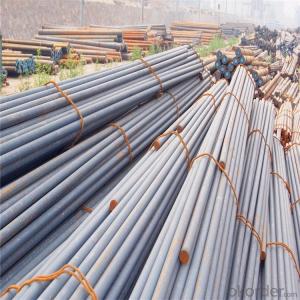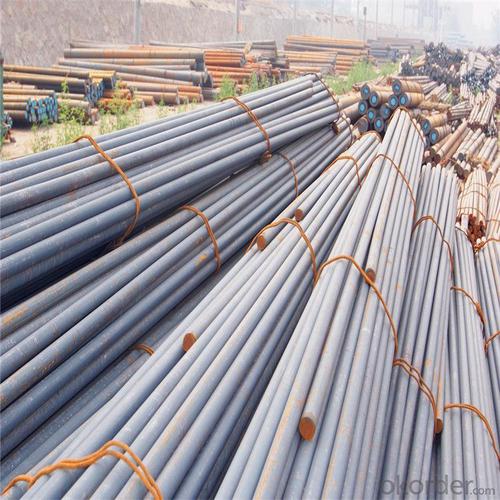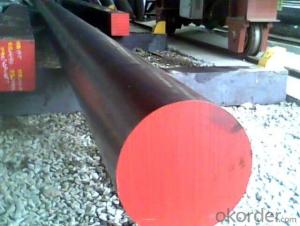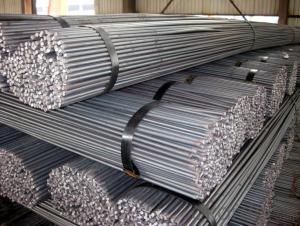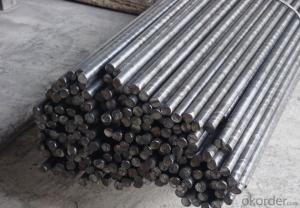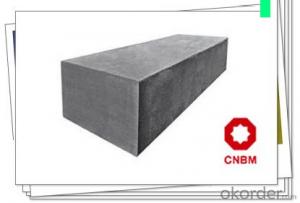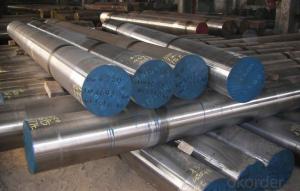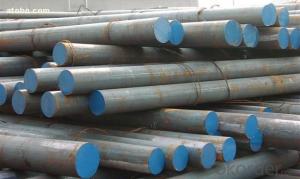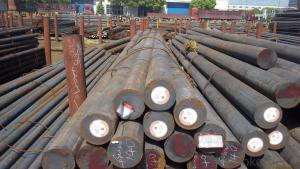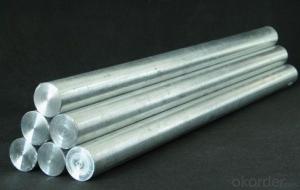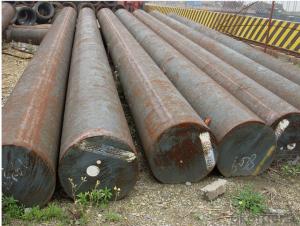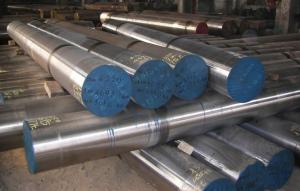Special Steel EN31 Round Steel Bar
- Loading Port:
- Shanghai
- Payment Terms:
- TT OR LC
- Min Order Qty:
- 100 m.t.
- Supply Capability:
- 50000 m.t./month
OKorder Service Pledge
OKorder Financial Service
You Might Also Like
Specification
Special Steel EN31 Round Steel Bar
Product Description of Special Steel EN31 Round Steel Bar
1. Steel grade: ASTM52100, SUJ2, 100Gr6, GCr15, EN31
2. Length: 6M-12M
3. Diameter: 10mm-300mm
4. Product range: round bar, flat bar, square bar, wire rod, sheet
5. Technique: Hot rolled, forged, cold drawn
Specification of Special Steel EN31 Round Steel Bar
Material | EN31 | Round bar | Dia(mm) | 10-300mm |
Process | EAF + LF + VD + Forged + Heat Treatment (optional) | Length (mm) | Max 12m | |
Heat treatment | Normalized / Annealed / Quenched / tempered | Flat bar | Thickness(mm) | 8-500mm |
Delivery condition | Hot forged +Rough machined (black surface after Q/T)+ Turned (optional) | Width(mm) | 70-200mm | |
Test | Ultrasonic test according to SEP 1921-84 D/d | Length (mm) | Max 12m |
Chemical Composition of Special Steel EN31 Round Steel Bar
C | Si | Mn | Cr | Ni | Mo | P | S |
0.95~1.05 | 0.15~0.35 | 0.25~0.45 | 1.40~1.65 | ≤0.30 | ≤0.10 | ≤0.025 | ≤0.025 |
Photo Show of Special Steel EN31 Round Steel Bar
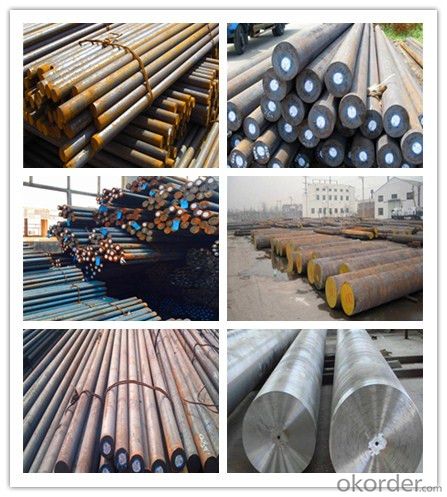
Packing and Delivery:
Packing in bundle package, or as customer's requirements.
Delivery Detail: 45 days after receiving the deposit.
Usage and Applications of Special Steel EN31 Round Steel Bar
1. Steel round bar is used in a large number of architectural and engineering structures. Or it can be used in construction of plants for the production of steel house frames, high-voltage transmission towers, bridges, vehicles, boilers, containers, ships, etc.
2. And we can use this kind of product on the performance of the mechanical parts if the demand is not very high.
3. Some special material steel round bar can be used for main shaft of steamer, hummer shank, with big section and supper force.
Company Information
CNBM International Corporation is the most important trading platform of CNBM group.
Whith its advantages, CNBM International are mainly concentrate on Cement, Glass, Iron and Steel, Ceramics industries and devotes herself for supplying high qulity series of refractories as well as technical consultancies and logistics solutions.


F A Q
1, Your advantages?
professional products inquiry, products knowledge train (for agents), smooth goods delivery, excellent customer solution proposale
2, Test & Certificate?
SGS test is available, customer inspection before shipping is welcome, third party inspection is no problem
3, Factory or Trading Company?
CNBM is a trading company but we have so many protocol factories and CNBM works as a trading department of these factories. Also CNBM is the holding company of many factories.
4, Payment Terms?
30% TT as deposit and 70% before delivery.
Irrevocable L/C at sight.
5, Trading Terms?
EXW, FOB, CIF, FFR, CNF
6, After-sale Service?
CNBM provides the services and support you need for every step of our cooperation. We're the business partner you can trust.
For any problem, please kindly contact us at any your convenient time.
We'll reply you in our first priority within 24 hours.
- Q: What are the typical hardness values for different grades of steel round bars?
- The typical hardness values for different grades of steel round bars can vary depending on the specific grade and manufacturing process. However, common ranges for hardness values in steel round bars can be between 200 and 400 on the Brinell hardness scale.
- Q: What is the typical hardness of a steel round bar?
- The typical hardness of a steel round bar can vary depending on the specific grade and composition of the steel. However, most steel round bars have a typical hardness ranging from 20 to 60 HRC (Rockwell Hardness Scale).
- Q: What are the different types of steel round bar alloys for improved toughness?
- Improved toughness is a characteristic associated with various steel round bar alloys. These alloys are specifically formulated to enhance the steel's capacity to withstand impact and resist deformation. Some commonly utilized steel round bar alloys for improved toughness comprise: 1. 4140 Alloy Steel: Renowned for its exceptional toughness and high tensile strength, this alloy finds application in areas that necessitate high impact resistance, such as automotive parts, gears, and shafts. 2. 4340 Alloy Steel: Similar to 4140, 4340 alloy steel offers remarkable toughness and strength. It is frequently employed in applications requiring high fatigue resistance, such as aircraft landing gear components and crankshafts. 3. 8620 Alloy Steel: This alloy is ideal for situations that demand both toughness and good wear resistance. It is commonly employed in gears, pinions, and other high-stress components. 4. 52100 Alloy Steel: Recognized for its high toughness and excellent wear resistance, 52100 alloy steel is frequently used in bearings, valve parts, and other heavy-duty applications. 5. H13 Tool Steel: While predominantly used in hot work applications, H13 tool steel is also acknowledged for its toughness and ability to withstand high impact loads. It is often employed in die casting dies, extrusion dies, and forging dies. 6. A2 Tool Steel: A2 tool steel is another alloy celebrated for its toughness and good wear resistance. It is commonly utilized in cutting tools, punches, and dies. These examples represent merely a fraction of the numerous steel round bar alloys meticulously engineered to deliver enhanced toughness. The selection of the appropriate alloy is contingent upon the specific requirements of the application and the desired level of toughness.
- Q: Can steel round bars be used for making brake components?
- Absolutely! When it comes to creating brake components, steel round bars are a fantastic choice. This is because steel possesses exceptional strength, durability, and heat resistance, making it a popular material in brake systems. By machining and shaping steel round bars, one can effortlessly fashion different brake components like brake discs, brake rotors, brake calipers, and brake pistons. The utilization of steel round bars guarantees that these brake components can effortlessly endure the intense pressures and temperatures produced during braking, resulting in a dependable and effective stopping ability.
- Q: How do you measure the straightness of a steel round bar?
- To measure the straightness of a steel round bar, there are a few methods that can be used. One common method is to use a straight edge or ruler and place it along the length of the bar, checking for any gaps or deviations. If the bar is perfectly straight, it should be in contact with the straight edge along its entire length. Any gaps or deviations indicate that the bar is not perfectly straight. Another method is to use a laser alignment system. This involves placing the round bar on a flat surface and using a laser to project a line along its length. The laser will show any deviations or bends in the bar by the way the line is projected. This method provides a more accurate measurement of straightness. In addition, a precision measuring instrument called a dial indicator can be used. This device has a small probe that is placed against the surface of the round bar. As the bar is rotated, the dial indicator will measure any variations in the surface, indicating any bends or deviations from straightness. It is important to note that the level of straightness required will depend on the specific application of the steel round bar. In some cases, a minor deviation may be acceptable, while in others, a high degree of straightness may be necessary.
- Q: Can steel round bars be used for making automotive suspension systems?
- Automotive suspension systems can indeed be made using steel round bars. These bars possess numerous advantages that render them suitable for this purpose. Primarily, steel is renowned for its exceptional strength and durability, two crucial characteristics for suspension components that must endure heavy loads and constant vibrations. Moreover, steel round bars offer superior stiffness and rigidity, allowing them to maintain the desired shape and functionality in diverse driving conditions. Additionally, steel is widely accessible and cost-effective, making it a favored option among automotive manufacturers. Furthermore, steel round bars can be easily machined and shaped into intricate forms, facilitating the production of suspension components with precise dimensions and specifications. In conclusion, steel round bars represent a dependable and pragmatic material for crafting automotive suspension systems.
- Q: What are the different grades of steel used for round bars?
- Round bars are commonly made from different grades of steel, each with its own composition and properties. These grades are suitable for various applications. Some widely used grades for round bars include: 1. Mild Steel (Low Carbon Steel): This is the most commonly used and basic grade of steel. It has a low carbon content, making it inexpensive and easy to work with. Mild steel round bars find applications in construction, automotive, and general engineering. 2. Carbon Steel: With higher carbon levels than mild steel, carbon steel offers improved strength and hardness. Round bars made from carbon steel are often used in high-stress applications like structural components, axles, and shafts. 3. Alloy Steel: By adding elements like chromium, nickel, or molybdenum to the base steel, alloy steel round bars enhance strength, toughness, and resistance to corrosion. They are commonly used in aerospace, automotive, and machinery industries. 4. Stainless Steel: Known for its corrosion resistance due to high chromium content, stainless steel round bars offer excellent strength, durability, and resistance to rust and staining. They are widely utilized in the food industry, marine applications, and architectural components. 5. Tool Steel: Designed specifically for high hardness, wear resistance, and heat resistance, tool steel round bars are commonly used in the manufacturing of cutting tools, dies, and molds. These examples demonstrate the variety of steel grades suitable for round bars. Each grade possesses unique properties, making them ideal for diverse applications across different industries.
- Q: How do steel round bars compare to glass round bars?
- Steel round bars and glass round bars are two different materials with distinct properties and applications. Here's how they compare: Strength and Durability: Steel round bars are known for their exceptional strength and durability. They have a high tensile strength and can withstand heavy loads and pressure without deformation. On the other hand, glass round bars are fragile and can break easily under stress or impact. They are not suitable for structural applications where strength is a crucial factor. Weight: Steel round bars are significantly heavier than glass round bars. While this can be an advantage in certain applications that require stability and support, it can also be a disadvantage in situations where lightweight materials are desired. Corrosion Resistance: Steel round bars are susceptible to corrosion, especially when exposed to moisture or harsh environments. However, they can be protected through coatings or alloys that enhance their corrosion resistance. Glass round bars, on the other hand, are not prone to corrosion and can be an ideal choice in corrosive environments. Transparency and Aesthetics: Glass round bars have the advantage of being transparent, allowing them to be used for decorative purposes or in applications where visibility is important. Steel round bars, being opaque, do not offer this characteristic. Thermal Conductivity: Steel round bars have a higher thermal conductivity compared to glass round bars. This property makes them more suitable for applications that require heat transfer or dissipation. Cost: Steel round bars are generally more affordable compared to glass round bars. Glass round bars, especially those made from specialized glass types, tend to be more expensive due to their production processes and limited availability. In conclusion, steel round bars are preferred for their strength, durability, and cost-effectiveness, making them suitable for structural applications. On the other hand, glass round bars offer transparency, aesthetic appeal, and corrosion resistance, making them suitable for decorative or specific applications where visibility is important. The choice between the two materials ultimately depends on the specific requirements and constraints of the project at hand.
- Q: How do you prevent steel round bars from warping during machining?
- One effective way to prevent steel round bars from warping during machining is by using proper machining techniques and tools. It is crucial to maintain consistent and balanced cutting forces, ensuring that the machining process does not generate excessive heat. Cooling techniques such as using coolant or lubricants can also help in dissipating heat and reducing warping. Additionally, using sturdy and rigid workholding devices to securely hold the round bars in place can minimize vibration and distortion. Lastly, allowing sufficient time for the steel round bars to cool down between machining operations can help to prevent warping.
- Q: What is the maximum phosphorus content allowed for steel round bars?
- The allowed phosphorus content in steel round bars is determined by the specific steel grade and industry standards, which can vary. Generally, the phosphorus content in steel round bars is typically limited to a maximum range of 0.04% to 0.05%. This limitation is necessary to maintain the desired mechanical properties, including strength, toughness, and ductility, of the steel product. Exceeding this phosphorus content can have negative consequences, such as reduced weldability, increased brittleness, and decreased corrosion resistance. To ensure the quality and performance of steel round bars in different applications, manufacturers and regulatory bodies establish stringent limits on phosphorus content. It is essential to refer to the relevant industry standards or specifications to determine the specific maximum phosphorus content permitted for a particular steel grade or application.
Send your message to us
Special Steel EN31 Round Steel Bar
- Loading Port:
- Shanghai
- Payment Terms:
- TT OR LC
- Min Order Qty:
- 100 m.t.
- Supply Capability:
- 50000 m.t./month
OKorder Service Pledge
OKorder Financial Service
Similar products
Hot products
Hot Searches
Related keywords
